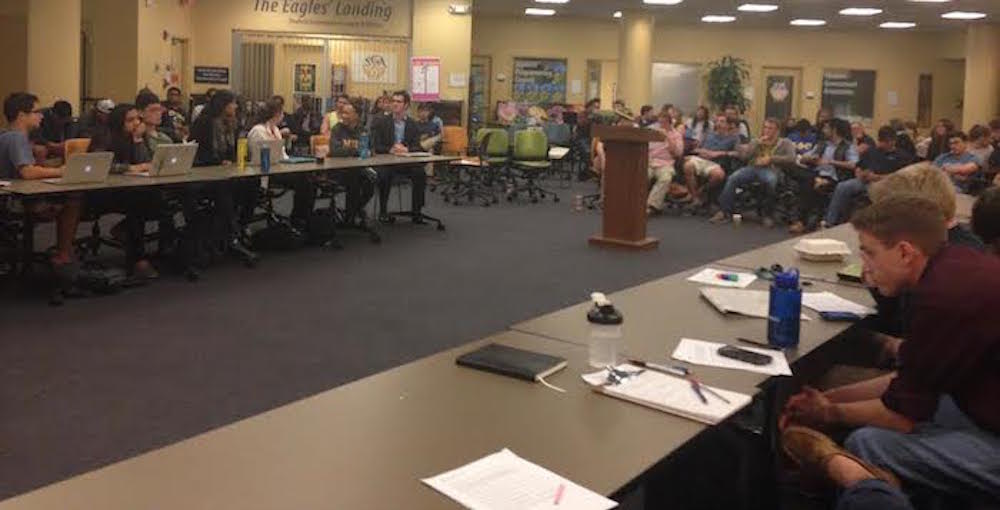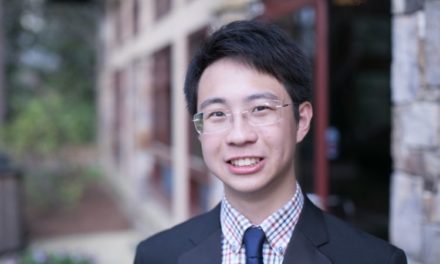The Student Government Association (SGA) increased the amount of money allocated to the Graduate Student Government Association (GSGA) from the Student Activities Fee (SAF) split and confirmed the internalization of the Student Programming Council (SPC) Vice Presidential election last night.
The SGA’s 48th Legislature discussed and debated a bill proposing an amendment to the SAF split for well over an hour during the Monday meeting, as members vacillated between whether or not GSGA required or deserved a considerable increase in funding.
Next year, the SAF will increase to $92 per semester from $89, the result of a scheduled Cost of Living Adjustment (CoLA). Every division will receive an increase in absolute funding. However, as part of this bill, GSGA will receive an additional two percent increase in funding, financed in part by reducing the Student Legal Services (SLS) fee allocation from one to zero percent. The current GSGA budget is roughly $80,000, and the current SGA budget is approximately $45,000.
It will also move SLS to the account for University-wide organizations, and decrease the amount that graduate students contribute to SGA by one percent to compensate for the GSGA funding increase.
SGA President and College junior Jon Darby and GSGA President and second-year Goizueta Business School MBA student Ely Goldberg co-authored the bill after members of the Executive Board reviewed the University-wide organizations account distributions to see which services graduate students were actually using.
After that review, the participants concluded that GSGA was in need of a substantial fund increase. However, many undergraduate representatives disagreed.
Vice President for Finance and College senior Patrick O’Leary reiterated his opposition to the bill, saying that it “takes away the increases of all the University-wide organizations and gives it to the GSGA.”
According to O’Leary, the Finance Committee believed that, “The GSGA [is] a less effective body than the divisional councils of each of the graduate divisions, and because they spend most of their money on a single event, the money could go better used toward being allocated towards the divisions specifically.”
Graduate students responded to O’Leary’s argument by explaining that GSGA needs more money because, historically, it has only had sufficient funds to host one event per year, a large graduate student mixer.
“We don’t have the budget to do that event and much [more] additional programming,” Goldberg said. “It makes it really hard for us to approve budgetary requests from organizations … This money will allow us to maintain our large event while doing additional initiatives.”
When O’Leary said that GSGA’s budget is almost twice that of SGA’s budget, Goldberg and other graduate students responded that GSGA’s budget was still insufficient because it has to perform many of the functions that SPC does for the undergraduate students.
Although SPC caters to both graduate and undergraduate students, Goldberg pointed out that SPC cannot serve alcohol, so GSGA fulfills that role instead.
O’Leary proposed an amendment to the bill that would “restore the status quo” and reallocate the two percent intended for the GSGA to the University- wide account.
The amendment would return the one percent being taken from the University-wide account, and it would move the one percent taken from Student Legal Services into the University-wide account as well.
O’Leary’s amendment passed by an 11-8-2 vote.
However, Darby informed the legislature that if the bill containing O’Leary’s amendment passed, then he intended to immediately veto the legislation.
“[Goldberg and I] co-authored this bill,” Darby said, “so when we came to this version of the fee split, there was definitely a method and a logic that got us there. I’m sympathetic to graduate students here.”
SGA subsequently passed a motion to re-hear O’Leary’s amendment. When the amendment was called into question again, it failed to pass by a 4-8-7 vote.
The original bill was then called into question, and the SGA representatives voted 12-6-5 against it.
Because the representatives struck down the bill out of reluctance to grant a two percent budget increase to GSGA, Darby explained that SGA had also killed several other important measures contained within the bill.
For example, SGA had erased the $47,000 for Student Organization Collaboration technologies, for which SGA had already signed a contract in and anticipation of receiving.
Following a warning from SGA School of Law Representative JJ Gonzalez (‘3L) for other SGA members to recognize “the completely different atmosphere” at the graduate schools that makes it necessary for GSGA to “have the money so that it can be its own programming body,” the bill that had just failed was once again called into question.
This time, the bill passed by a 16-4-1 vote. The other main bill of the evening, submitted by Vice President for Programming, SPC President and Goizueta Business School senior Michael Nathin, proposed to limit voting in the SPC Vice Presidential election only to SPC members. Furthermore, it also proposed adding graduate student representatives to SPC in non-voting, ex-officio roles.
Although the bill passed by an 11-7-2 vote last week, it needed to be passed in two consecutive sessions of the SGA in order to become official.
Nathin acknowledged that since SPC uses the student body’s money, the SPC president should always be chosen through a University-wide popular election. However, he noted that the election process within SPC is very stressful. Considering that SPC meets in a closed-door environment, Nathin explained his belief that SPC members themselves were in the best position to at least decide on their own vice president.
The role of SPC vice president is strictly internal, and the vice president has no control over SPC spending.
The bill passed by a 14-2-6 vote, and it will take immediate effect during this year’s annual student spring elections, which will take place from Feb. 27 to March 2.
— By Luke White, SGA Beat Writer






